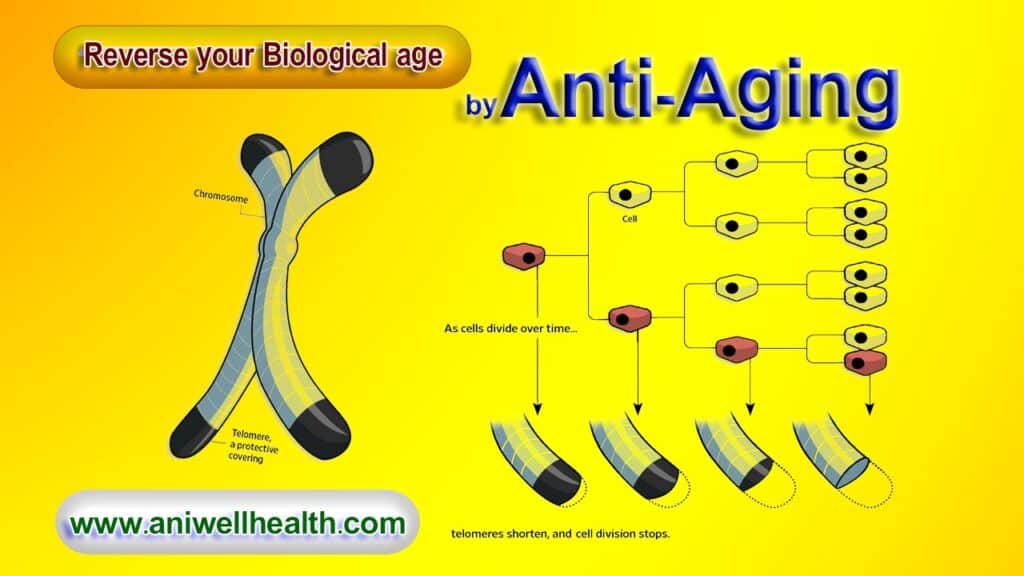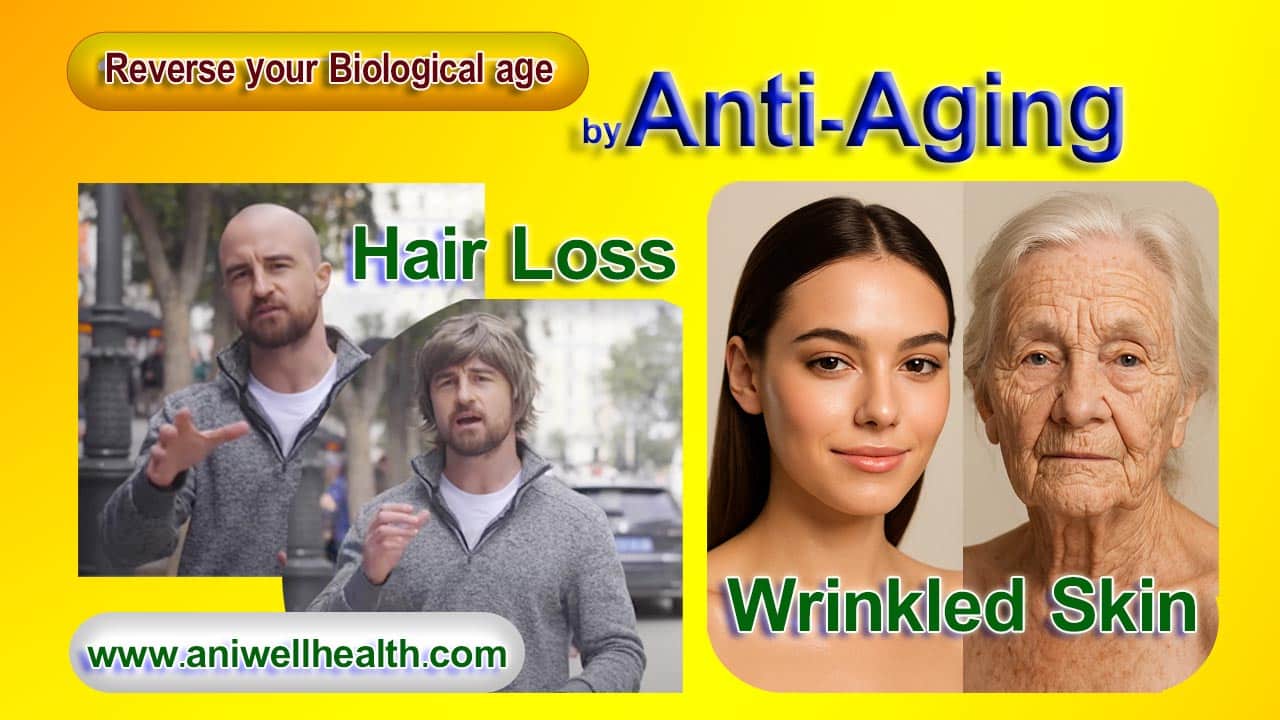Anti-aging refers to the process of slowing down and reversing the signs of aging, this leads to healthy physical, mental, and emotional changes. Anti-aging can be achieved through various activities like lifestyle changes, medical treatments, and taking the right Supplements, etc. There are some symptoms associated with aging. But these symptoms can be caused by a variety of reasons, not just aging. Consult a healthcare professional to determine the root cause of any symptoms you are experiencing.
Aging Symptoms
- Physical Symptoms:
- Wrinkles and fine lines: Appearance of wrinkles, fine lines, and age spots on the skin.
- Skin sagging: Loss of skin elasticity, leading to sagging skin, especially on the face, neck, and hands.
- Hair loss: Thinning or loss of hair, particularly on the head.
- Weight gain: Increase in body weight, especially around the midsection.
- Loss of muscle mass: Decrease in muscle mass and strength.
- Joint pain: Pain and stiffness in joints, especially in the hands, hips, and knees.
- Mental and Emotional Symptoms:
- Memory loss: Difficulty remembering recent events, learning new information, or recalling familiar words.
- Mood changes: Increased irritability, anxiety, or depression.
- Loss of motivation: Decreased enthusiasm, energy, or interest in activities.
- Sleep disturbances: Difficulty falling asleep, staying asleep, or experiencing restful sleep.
- Metabolic Symptoms:
- Insulin resistance: Decreased sensitivity to insulin, leading to high blood sugar levels.
- High blood pressure: Increase cardiovascular disease with high blood pressure.
- High cholesterol: Elevated levels of LDL (bad) cholesterol, which can increase the risk of heart disease.
- Hormonal Symptoms:
- Menopause symptoms: Hot flashes, night sweats, and vaginal dryness in women.
- Andropause symptoms: Decreased libido, erectile dysfunction, and mood changes in men.
- Thyroid issues: Changes in thyroid hormone levels, leading to fatigue, weight gain, or weight loss.
- Other Symptoms:
- Vision changes: Difficulty reading, blurred vision, or sensitivity to light.
- Hearing loss: Decreased ability to hear high-pitched sounds or understand speech.
- Digestive issues: Constipation, diarrhea, or decreased digestive efficiency.
- Cellular Changes:
- Telomere shortening: Telomeres, which protect DNA, shorten with each cell division.
- Epigenetic changes: Gene expression changes due to epigenetic modifications.
- Cellular senescence: Cells become less responsive to stimulation and may enter a state of senescence.
- Hormonal Changes:
- Decreased hormone production: Production of hormones like estrogen, testosterone, and growth hormone decreases.
- Insulin resistance: Cells become less responsive to insulin, leading to high blood sugar levels.
- Thyroid hormone changes: Thyroid hormone levels may decrease, leading to fatigue, weight gain, and other symptoms.
- Organ System Changes:
- Cardiovascular changes: Blood vessels stiffen, and cardiac output decreases.
- Musculoskeletal changes: Muscle mass and strength decrease, and bones become less dense.
- Nervous system changes: Neurons die, and neural connections are lost, leading to cognitive decline.
- Immune System Changes:
- Immunosenescence: The immune system becomes less effective at fighting infections.
- Inflammaging: Chronic, low-grade inflammation increases with age.
- Genetic Changes:
- DNA damage: DNA damage accumulates over time, leading to mutations and epigenetic changes.
- Genetic instability: Genetic material becomes less stable, leading to an increased risk of cancer and other diseases.
Aging Factors
- Lifestyle Factors:
- Exercise: Regular physical activity helps maintain physical and mental health.
- Healthy diet: Eating a balanced diet rich in fruits, vegetables, and whole grains supports overall health.
- Sleep: Getting adequate sleep (7-9 hours) helps regulate aging processes.
- Stress management: Engaging in stress-reducing activities like meditation or yoga can help mitigate aging effects.
- Nutritional Factors:
- Antioxidants: Vitamins C and E, beta-carotene, and other antioxidants help protect cells from damage.
- Omega-3 fatty acids: These healthy fats support heart health and may reduce inflammation.
- Vitamin D: Maintaining adequate vitamin D levels is essential for bone health and immune function.
- Probiotics: Beneficial bacteria in the gut support immune function and overall health.
- Hormonal Factors:
- Hormone balance: Maintaining balanced hormone levels, particularly insulin, growth hormone, and cortisol, is crucial for anti-aging.
- Testosterone: Optimizing testosterone levels supports muscle mass, bone density, and overall health for anti-aging.
- Environmental Factors:
- Sun protection: Protecting skin from UV radiation helps prevent premature aging.
- Air quality: Minimizing exposure to air pollution supports lung health and overall well-being.
- Toxin avoidance: Limiting exposure to environmental toxins, such as pesticides and heavy metals, is essential for anti-aging.
- Genetic Factors:
- Telomere length: Maintaining longer telomeres, which protect DNA, is associated with healthy aging.
- Epigenetic factors: Lifestyle choices can influence epigenetic markers, which affect gene expression and aging.
- Don’t overexpose yourself to the sun: Protect your skin from excessive sun exposure to prevent premature aging.
- Wear protective gear: Wear protective gear, such as helmets and seatbelts, to prevent injuries.
- Stay socially connected: Maintain social connections and build strong relationships to support mental and emotional health.
Remember: Prevention is better than Cure.
Prevent or slow down biological aging and support Anti-aging:
- Lifestyle Changes aging and supports anti-aging:
- Exercise regularly: Engage in moderate-intensity exercise, such as brisk walking, cycling, or swimming.
- Eat a healthy diet: Focus on whole, unprocessed foods like fruits, vegetables, whole grains, lean proteins, and healthy fats.
- Don’t smoke: Smoking accelerates aging and increases the risk of age-related diseases.
- Limit alcohol consumption: Excessive alcohol consumption can lead to premature aging.
- Get enough sleep: Aim for 7-9 hours of sleep per night to help your body repair and rejuvenate.
- Medical Interventions:
- Hormone replacement therapy: For some individuals, hormone replacement therapy may be beneficial for anti-aging.
- Supplements: Certain supplements, such as omega-3 fatty acids, vitamin D, and probiotics, may support anti-aging efforts.
- Nutrition and Supplements for anti-aging:
- Antioxidants: Consume foods rich in antioxidants, such as berries, leafy greens, and other fruits and vegetables.
- Omega-3 fatty acids: Include sources of omega-3s, like fatty fish, nuts, and seeds, in your diet.
- Vitamin D: Maintain adequate vitamin D levels through sun exposure, supplements, or fortified foods.
- Probiotics: Support gut health with probiotic-rich foods or supplements.
- Stress Management:
- Meditate: Regular meditation can help reduce stress and promote relaxation.
- Yoga: Practice yoga to combine physical movement with stress-reducing techniques.
- Deep breathing: Engage in deep breathing exercises to calm your mind and body.
- Mental Stimulation:
- Learn new skills: Engage in lifelong learning to challenge your brain and build cognitive reserve.
- Read and puzzle: Regularly read books, solve puzzles, or play strategic games to keep your mind active.
Research for Anti-aging:
- Biological Research:
- Telomere length and aging: Investigate the relationship between telomere length and aging.
- Epigenetic changes and aging: Examine how epigenetic changes contribute to aging.
- Senescence and aging: Study the role of cellular senescence in aging.
- Lifestyle and Nutrition Research:
- Dietary patterns and aging: Investigate the impact of different dietary patterns on aging.
- Exercise and aging: Examine the effects of exercise on aging and age-related diseases.
- Sleep and aging: Study the relationship between sleep quality and aging.
- Psychological and Social Research:
- Cognitive aging: Investigate the cognitive changes that occur with aging.
- Social isolation and aging: Examine the impact of social isolation on aging and age-related diseases.
- Mental health and aging: Study the relationship between mental health and aging.
- Technology and Anti-aging Research:
- Aging and technology adoption: Investigate how older adults adopt and use technology.
- Telehealth and aging: Examine the impact of telehealth on aging and age-related diseases.
- Artificial intelligence and aging: Study the potential applications of AI in aging research.
Health Check-Ups:
- Regular health check-ups:
- Schedule regular health check-ups to monitor your health and catch any potential issues early.
- Screenings:
- Participate in recommended health screenings, such as mammograms, colonoscopies, and blood pressure checks.
- Blood Tests:
- Complete Blood Count (CBC): Evaluates blood cell counts and detects anemia, infection, or bleeding disorders.
- Blood Chemistry Tests: Measures liver and kidney function, blood sugar, and electrolyte levels.
- Lipid Profile: Assesses cholesterol and triglyceride levels to evaluate cardiovascular risk.
- Thyroid Function Tests: Evaluate thyroid hormone levels to diagnose hypothyroidism or hyperthyroidism.
- Imaging Tests:
- X-rays: Evaluate bone density and detect osteoporosis or fractures.
- Computed Tomography (CT) Scans: Assesses internal organs, such as the brain, lungs, and liver.
- Magnetic Resonance Imaging (MRI) Scans: Evaluate joint and musculoskeletal health, as well as detect age-related diseases like Alzheimer’s.
- Ultrasound: Assesses organ function and detects age-related diseases like atherosclerosis.
- Functional Tests:
- Cognitive Function Tests: Evaluate memory, attention, and cognitive processing speed.
- Physical Performance Tests: Assesses balance, gait, and functional ability.
- Pulmonary Function Tests: Evaluate lung function and detect age-related diseases like chronic obstructive pulmonary disease (COPD).
- Genetic Tests for Anti-aging:
- Genetic Risk Assessment: Evaluates genetic risk for age-related diseases like Alzheimer’s and Parkinson’s.
- Telomere Length Testing: Measures telomere length to assess biological aging.
- Other Tests:
- Bone Density Tests: Evaluate bone density to diagnose osteoporosis.
- Hearing and Vision Tests: Assesses hearing and vision function to detect age-related decline.
- Sleep Studies: Evaluate sleep quality and detect sleep disorders like insomnia or sleep apnea.
- These medical tests can help healthcare professionals assess aging and age-related diseases, enabling early intervention and prevention strategies.
- Here are some biological age tests and knowing anti-aging strength:
- Biological age tests
- Epigenetic Clock Tests:
- Horvath Clock: Measures DNA methylation to estimate biological age.
- Hannum Clock: Assesses DNA methylation to estimate biological age.
- PhenoAge Clock: Measures DNA methylation and clinical biomarkers to estimate biological age.

- Telomere Length Tests:
- Telomere Length Analysis: Measures telomere length using PCR or fluorescence in situ hybridization (FISH).
- Telomere Shortening Test: Measures telomere shortening rate to estimate biological age.
- Gene Expression Tests:
- Gene Expression Profiling: Analyze gene expression patterns to estimate biological age.
- Transcriptomic Age: Measures gene expression to estimate biological age.
- Proteomic Tests:
- Protein Biomarker Analysis: Measures protein biomarkers, such as albumin or creatinine, to estimate biological age.
- Proteomic Age: Analyzes protein expression patterns to estimate biological age.
- Metabolic Tests:
- Metabolic Age Test: Measures metabolic biomarkers, such as glucose or insulin, to estimate biological age.
- Mitochondrial Function Test: Assesses mitochondrial function to estimate biological age.
- Inflammatory Tests:
- Inflammatory Biomarker Test: Measures inflammatory biomarkers, such as C-reactive protein (CRP) or interleukin-6 (IL-6), to estimate biological age.
- Oxidative Stress Test: Measures oxidative stress biomarkers to estimate biological age.
- Other Tests:
- GlycanAge Test: Measures glycan biomarkers to estimate biological age.
- Biological Age Test: A comprehensive test that combines multiple biomarkers to estimate biological age.
Please note that these tests are not definitive and should be used in conjunction with other health assessments. Consult with a healthcare professional before undergoing any biological age test.
Biological age tests assess an individual’s physiological age, which may differ from their chronological age, providing insights into overall health and aging processes. In India, several providers offer such tests with varying methodologies.

Awesome article! 🙌 I love how it highlights that anti-aging isn’t just about looks 👀, but also about feeling good inside and out 💪🧠💖. The tips are super practical ✨ and the reminder to check with a doctor 👩⚕️👨⚕️ is spot on! Thanks for sharing this! 🌿😊
Thank You Rajesh